====================
A sermon offered on the Eve of the Feast of St. Alban, First Martyr of Britain, June 21, 2015, to the people of St. Paul’s Episcopal Church, Medina, Ohio, where Fr. Funston is rector.
(The lessons for the day are Wisdom 3:1-9; Psalm 31:1-5; 1 John 3:13-16; and Matthew 10:34-42.)
====================
Heavenly Father,
We have come over a way that with tears has been watered.
We have come, treading our path through the blood of the slaughtered,
God of our weary years,
God of our silent tears,
Thou who hast brought us thus far on the way;
Thou who hast by Thy might,
Led us into the light,
Keep us forever in the path, we pray.
Amen.
We are moving away from the Lectionary this morning and are using the propers for the commemoration of St. Alban, First Martyr of Britain, whose feast is tomorrow. I hope you’ll forgive me this personal conceit: we are doing so because twenty-four years ago today, on the Eve of St. Alban’s Day 1991, the Right Rev. Stewart Zabriskie, bishop of the Diocese of Nevada and about 30 presbyters of that diocese laid their hands upon me and ordained me a priest in Christ’s One, Holy, Catholic, and Apostolic Church.
In our gospel lesson today, Jesus promises that one result of following him will be conflict with one’s family: “I have come to set a man against his father,” he said. Those are hard words to hear spoken on Father’s Day (which today also happens to be), but they are words that speak to me because of my family history. I have spoken to you often of my father, York Funston, and of my grandfather, Charles Edgar Funston (known to everyone as “CE”), but you may not have notice that I have never involving both of them. That is because during the time they were both alive during my lifetime they never spoke to one another; I can recall no time when they were ever together.
When my father came home from the Second World War and finished his degree at Washburn University in Topeka, Kansas, my father and mother moved to southern Nevada. That was in 1947. From that point until he died in 1958, my father never again saw nor did he ever speak to his father. The reason was a very simple one, but one which is deeply imbedded in the culture of this country and is the besetting sin of our society; I believe it may be a chronic disease that is killing country.
My father had been an enlisted man in the US Army artillery. While serving in the European theater, he had become friends with several black service men. That was, I believe, a transformative experience for him. I don’t know what may have happened between my father and grandfather to sever their relationship, but I do know this . . . my grandfather was a racist: until he died in 1977, I never heard my grandfather ever refer to an African American by any term other than “n***er.” That was an attitude and a word my father simply could not and would not tolerate.
When my grandfather died in 1977 it was because he had suffered a stroke. My grandfather suffered that stroke because he, like every other member of our family (myself included) had a chronic disease, high blood pressure. Being a stubborn man, he did nothing about it and eventually that stubbornness caught up with him. He suffered a stroke, became bed ridden, and eventually contracted pneumonia which killed him. His chronic disease weakened him; the opportunistic, acute illness killed him.
The accurate medical term for high blood pressure is “hypertension,” a word which was originally coined in the mid-19th Century to mean, “excessive or extreme emotional tenseness.” That’s what racism is, a hypertension, a chronic disease which is killing American society.
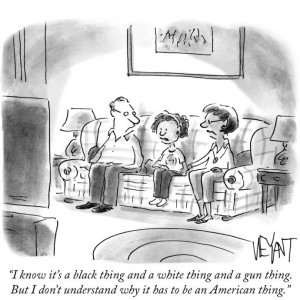 On Wednesday night, America witnessed what happens when that chronic illness is augmented by the acute and opportunistic disease of easy unfettered unregulated unrestricted access to firearms. A 21-year-old white man named Dylann Roof with a history of racism planned and carried out the murders of nine black men and women worshiping in their church, Emanuel African Methodist Episcopal Church in Charleston, South Carolina; four of those who died were pastors of the church, including the senior pastor Clementa Pinckney, who was also a South Carolina state senator.
On Wednesday night, America witnessed what happens when that chronic illness is augmented by the acute and opportunistic disease of easy unfettered unregulated unrestricted access to firearms. A 21-year-old white man named Dylann Roof with a history of racism planned and carried out the murders of nine black men and women worshiping in their church, Emanuel African Methodist Episcopal Church in Charleston, South Carolina; four of those who died were pastors of the church, including the senior pastor Clementa Pinckney, who was also a South Carolina state senator.
Researcher Timothy Tyson of Duke University has written recently about the killer . . .
[A photograph of Roof shows] a young man wear[ing] Rhodesian and apartheid-era [South African] flags on his jacket. Both countries never existed during his lifetime. Both flags are commonly worn as in-group insignia among politically organized white supremacists.
Dylann Roof told his victims that he came to kill black people because they are “raping our women and taking over our country.” Both claims date back to the white supremacy campaigns of the 1890s . . . . These ideas did not just percolate up inside of his mind; this is not ordinary “bias” or suspicion of people different from him; someone had to teach him these elaborated historical traditions. * * * He gunned down nine people at a historic black church, historic enough that he might well have selected it intentionally; Emanuel AME has been at the center of the civil rights struggle since the early 19th century. * * *
Roof said he wanted to start a race war; this is a common theme among white supremacists and depicted in their favorite book, The Turner Diaries, which also helped inspire Timothy McVeigh to commit the Oklahoma City bombings. He is part of something, . . . something dangerous. America in general and South Carolina in particular are generously sprinkled with white supremacist groups. (From a Facebook Note)
Wednesday’s tragedy, unfortunately, is only one of several recent incidents throughout the nation which have made it clear that racism is a chronic disease that is killing us. It may even be a part of our nation’s DNA. The evil institution of white Europeans owning black African slaves was allowed by our Founders to continue here when our nation was created. Some recognized the iniquity of doing so. Abigail Adams, wife of the first Vice President, once wrote in a letter to her husband, “I wish most sincerely there was not a slave in this province. It always appeared a most iniquitous scheme to me to fight ourselves for what we are daily robbing and plundering from those who have as good a right to freedom as we have.”
Many people do not realize that the U.S. Constitution as originally adopted provide that, in determining the proportional representation in House of Representatives, blacks were to be counted as lesser than whites. Specifically, it provided that the number of representatives to which a state was entitled would be “determined by adding to the whole Number of free Persons, including those bound to Service for a Term of Years, and excluding Indians not taxed, three fifths of all other Persons.” (Art. I, Sec. 2, Cl. 3)
Interestingly, it was not the southern slave owners who inserted that provision, it was northerners. Elbridge Gerry, a deputy from Massachusetts who later became the fifth Vice President of the United States, objected to counting blacks at all arguing, “Why should the blacks, who were property in the South, be in the rule of representation more than the cattle and horses of the North?” I think we can all agree that valuing African Americans as nothing more than cattle or horses, or even as 3/5 of a free white person, is simply wrong; there is no other word for it – it’s wrong! Racism is a chronic disease from which America seems always to have suffered; it is our nation’s original and besetting sin.
Although it is historically wrong to assert that the United States was founded to be a “Christian nation,” it is not inaccurate to recognize that most of the Founders were members of the Christian church; many, in fact, were Episcopalians. That Christians should have valued other human beings, black human beings, many of whom were themselves converts to the Christian faith, as of lesser value, as of no more value “than cattle and horses” boggles the mind. It flies in the face of, it is a direct violation of Christ’s new commandment: “Love one another as I have loved you.” (Jn 15:12) As the portion of the First Letter of John read this morning reminds us, “Whoever does not love abides in death. All who hate a brother or sister are murderers, and you know that murderers do not have eternal life abiding in them.” (1 Jn 3:14b-15) Racism, the hatred of a brother or sister human being simply because their skin color differs from one’s own, is deadly; it is the chronic hypertension that is weakening and killing our country.
When a chronic illness weakens the body, an acute opportunistic infection can bring death. My grandfather’s weakened condition, bedridden from a hypertension-induced stroke, made him a prime target for deadly pneumonia. Weakened by the hypertension of racism, our country is a prime target for the deadly destruction that the acute problem of easy unfettered unregulated unrestricted access to guns can wreak. Now, I know, some will answer me that the right to bear arms is a constitutional right guaranteed by the Second Amendment and I really do not want to get into that argument today; let me just leave the issue with one thought – if the Constitution could be wrong today about the 3/5 valuation of black Americans, could it not also be wrong today about firearm access and ownership?
May I shift gears here and tell you how I spent my day on Friday?
I started the day earlier than usual getting to the office at 7:30 a.m. because I had a 9 o’clock doctor’s appointment and I wanted to be sure the rooms where, later, bicycles would be stowed overnight were ready for that. So I got here, and moved tables and chairs out of the way. Then I worked on the Prayers of the People for today’s services until I had to go my physician’s office. That didn’t take very long, so on the way back to the church I made a pastoral call. When I got back here, I met with a parishioner about pre-planning her and her spouse’s funerals, then I put together some materials for the clergy who will be substituting here while I am at General Convention. By then it was about 1 p.m. so I took the dog home (she’d been with me through all that I just outlined), grabbed a quick bite to eat, and got back here by 2 p.m. to begin receiving the 28 bicycle riders we would be hosting. From then until we sat down to dinner with them I ran several errands getting riders to their lodgings and picking up a few things for the kitchen crew, then I helped set the tables for dinner. After welcoming our guests to supper, I sat down at a table with the bishop expecting to enjoy dinner, only to be informed that a toilet in the ladies’ room was overflowing. I am grateful to my lady-wife, who got a plunger and went to work, but unfortunately things only went from bad to worse. Eventually, I found myself standing in a puddle of rather unsavory water on the phone with our plumber and then with Roto-Rooter arranging a late night service call. So after we broke down the tables and set up the chairs for Free Farmers’ Market, I sat here while the Roto-Rooter man did his job. Eventually he cleared what turned out to be a 75-ft long plug of God-knows-what, and he and I left at around 10:30 pm.
Days like that are not typical for clergy, but they are not uncommon, either. Usually after such a day, I go home tired but feeling pretty good about the life to which I’ve been called and which I’ve lived for 24 years of ordained ministry. The priesthood is a privilege and, no matter how tiring a day may be, it is usually a joyful mystery.
Friday, however, on the way home, I started crying. I got to thinking about Clementa Pinckney who, though very much younger than I, had been a pastor for just about the same amount of time, 23 years in his case. And I got to thinking about his fellow pastors DePayne Middleton-Doctor, Daniel Simmons Sr., and Sharonda Singleton, all of them gunned-down with five of their parishioners at Emanuel AME Church by a hate-filled, 21-year-old, white supremacist. I got to thinking about how I’m sure they had had similar days of ministry, and about how terrible it is that they are not still alive to do those things for their congregation, to visit their parishioners, to help plan funerals and weddings, to bear the frustrations of coordinating activities with bishops, to be burdened by the annoyance of clogged sewer pipes, and to endure the exhaustion of 16-hour days. And the only reason they are not . . . is racism. I believe that, as the Book of Wisdom reminds us, they “are in the hand of God, and no torment will ever touch them” and that their witness “will shine forth, and will run like sparks through the stubble” (3:1,7), but we would all so much prefer that Wednesday had never happened.
On the anniversary of my ordination, I would so much prefer to preach about anything else, but the reality of racism cannot be denied, the sin of racism must be confronted. I don’t know if my father ever confronted my grandfather about his racism. I know that I never did and by failing to do so I am as guilty as him. Racism is our nation’s besetting sin and we must repent; it our society’s chronic illness and we must cure it, because it is killing our country.
Let us pray:
Good and gracious God, you created every human being in your image and likeness; we are weary, we are tired, we are sick of the besetting sin of racism that infects our country: we repent of the ways we have participated in or benefited from racial injustice; we ask forgiveness for the ways our nation continues to foster an environment of separation; break through the strongholds of superiority, destroy the dividing lines of racial separation, cure us of the toxic disease of prejudice, forgive us; make your church a model of unity, a beacon of reconciliation, and keep us on the path that leads to your light; through your Son, our Savior, Jesus Christ, who lives and reigns with you and the Holy Spirit, one God, now and for ever. Amen.
====================
A request to my readers: I’m trying to build the readership of this blog and I’d very much appreciate your help in doing so. If you find something here that is of value, please share it with others. If you are on Facebook, “like” the posts on your page so others can see them. If you are following me on Twitter, please “retweet” the notices of these meditations. If you have a blog of your own, please include mine in your links (a favor I will gladly reciprocate). Many thanks!
====================
Father Funston is the rector of St. Paul’s Episcopal Church, Medina, Ohio.
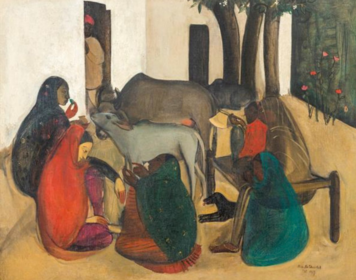 “They’re eating the dogs, they’re eating the cats.”
“They’re eating the dogs, they’re eating the cats.” Today, by translation from Thursday, the 1st of November, we celebrate the Feast of All Saints.
Today, by translation from Thursday, the 1st of November, we celebrate the Feast of All Saints. Today is the first Sunday in November which means that instead of the normal sequence of lessons for Ordinary Time, we are given the option of reading the lessons for All Saints Day, which falls every year on November 1. So today we heard a reading from the Wisdom of Solomon (a part of the apocrypha in which we hear that the righteous are in the hand of God), a psalm reminding us that the saints pledge themselves to truth rather than falsehood, a bit of the Book of Revelation describing the “new Jerusalem” where God will make God’s home with the saints, and (oddly enough) to the story of the raising of Lazarus in John’s Gospel.
Today is the first Sunday in November which means that instead of the normal sequence of lessons for Ordinary Time, we are given the option of reading the lessons for All Saints Day, which falls every year on November 1. So today we heard a reading from the Wisdom of Solomon (a part of the apocrypha in which we hear that the righteous are in the hand of God), a psalm reminding us that the saints pledge themselves to truth rather than falsehood, a bit of the Book of Revelation describing the “new Jerusalem” where God will make God’s home with the saints, and (oddly enough) to the story of the raising of Lazarus in John’s Gospel.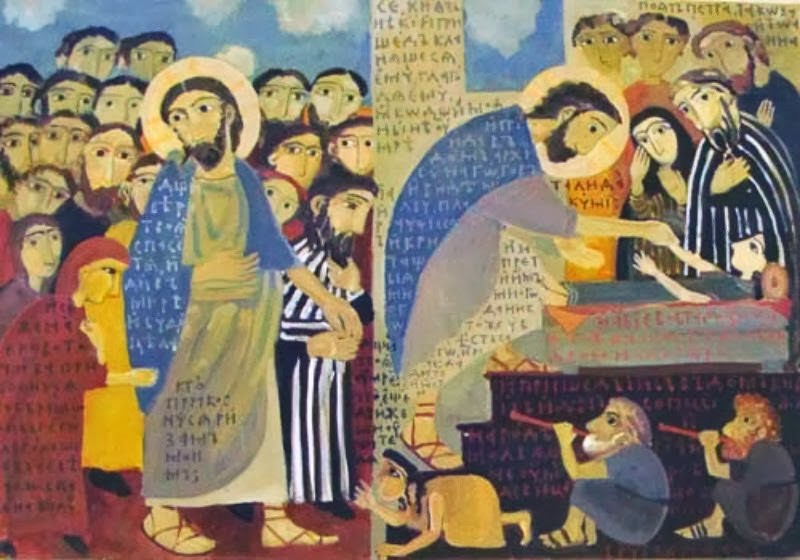 It had gone on so long she couldn’t remember a time that wasn’t like this. She lived in constant fear. She wasn’t just cranky and out-of-sorts; she was terrified. Her life wasn’t just messy and disordered; it was perilous, precarious, seriously even savagely so. It was physically and spiritually draining, like being whipped every day.
It had gone on so long she couldn’t remember a time that wasn’t like this. She lived in constant fear. She wasn’t just cranky and out-of-sorts; she was terrified. Her life wasn’t just messy and disordered; it was perilous, precarious, seriously even savagely so. It was physically and spiritually draining, like being whipped every day. Again, this week, we have another familiar parable in our Gospel lesson, the story of the wheat and the weeds. I will come back to it. But first, I’d like to tell you about my older brother who died 24 years ago.
Again, this week, we have another familiar parable in our Gospel lesson, the story of the wheat and the weeds. I will come back to it. But first, I’d like to tell you about my older brother who died 24 years ago. 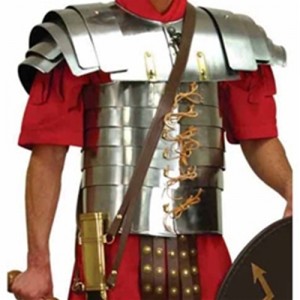 In the Education for Ministry program, the first year is spent reading the Old Testament, parts of which can be as dull as dirt! There are those long lists of genealogies, long catalogues of tribes and families, the lengthy and detailed instructions for making and erecting the tabernacle that the Hebrews carried along with them in the desert and, of course, a description of the Temple which Solomon built. In our EfM group, we sort of got into a habit of not reading those parts, of just acknowledging they were there but sort of skipping lightly over them. But it is there, earlier in the First Book of Kings from which our First Lesson is taken, a description of the building in which, in today’s lesson, Solomon places the Ark of the Covenant. Solomon’s Temple (the “First Temple”) was massive; it wasn’t really very big, but it was solid and substantial. It was built of huge blocks of solid stone; it had support beams made of whole cedar trees; it had immense fixtures and columns made of solid bronze and gold. In a word, it was a fortress!
In the Education for Ministry program, the first year is spent reading the Old Testament, parts of which can be as dull as dirt! There are those long lists of genealogies, long catalogues of tribes and families, the lengthy and detailed instructions for making and erecting the tabernacle that the Hebrews carried along with them in the desert and, of course, a description of the Temple which Solomon built. In our EfM group, we sort of got into a habit of not reading those parts, of just acknowledging they were there but sort of skipping lightly over them. But it is there, earlier in the First Book of Kings from which our First Lesson is taken, a description of the building in which, in today’s lesson, Solomon places the Ark of the Covenant. Solomon’s Temple (the “First Temple”) was massive; it wasn’t really very big, but it was solid and substantial. It was built of huge blocks of solid stone; it had support beams made of whole cedar trees; it had immense fixtures and columns made of solid bronze and gold. In a word, it was a fortress! On Wednesday night, America witnessed what happens when that chronic illness is augmented by the acute and opportunistic disease of easy unfettered unregulated unrestricted access to firearms. A 21-year-old white man named Dylann Roof with a history of racism planned and carried out the murders of nine black men and women worshiping in their church, Emanuel African Methodist Episcopal Church in Charleston, South Carolina; four of those who died were pastors of the church, including the senior pastor Clementa Pinckney, who was also a South Carolina state senator.
On Wednesday night, America witnessed what happens when that chronic illness is augmented by the acute and opportunistic disease of easy unfettered unregulated unrestricted access to firearms. A 21-year-old white man named Dylann Roof with a history of racism planned and carried out the murders of nine black men and women worshiping in their church, Emanuel African Methodist Episcopal Church in Charleston, South Carolina; four of those who died were pastors of the church, including the senior pastor Clementa Pinckney, who was also a South Carolina state senator. 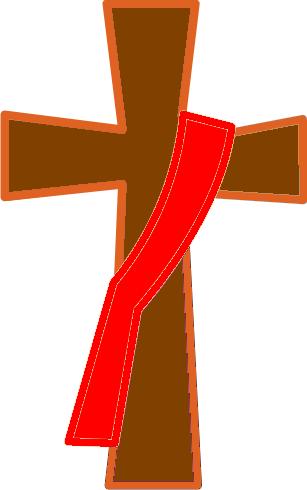
 Last evening while driving home from the midweek Eucharist, I listened to a program on the local NPR station in which the host and a guest were discussing the internet coverage of news. One of the things mentioned was that the analytics on a British tabloid’s website had demonstrated that a story about Taylor Swift’s legs had garnered more “clicks” and more viewing time than a simultaneously run story about the world-wide affects of global climate change – something on the order of 400% more! The discussion continued with similar examples of stories about Kim Kardashian and her “rear end,” Justin Bieber’s legal problems, and more.
Last evening while driving home from the midweek Eucharist, I listened to a program on the local NPR station in which the host and a guest were discussing the internet coverage of news. One of the things mentioned was that the analytics on a British tabloid’s website had demonstrated that a story about Taylor Swift’s legs had garnered more “clicks” and more viewing time than a simultaneously run story about the world-wide affects of global climate change – something on the order of 400% more! The discussion continued with similar examples of stories about Kim Kardashian and her “rear end,” Justin Bieber’s legal problems, and more.

